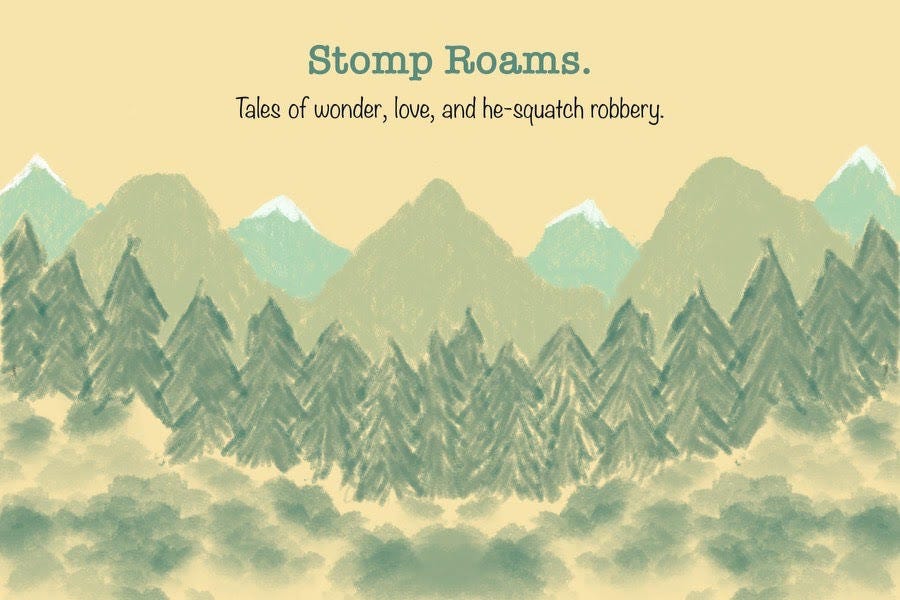The Stomp Universe Reference Guide.
An ever-evolving glossary. Where the scholars go to dig.
The Barnaby & Co. Establishment
Barnaby & Co. is North America’s oldest establishment of Fantastical hunters, shrouded in a hazy mythos of wealth and cruelty. During the French and Indian War, the Barnaby family established a pipeline of illegal fur-trading, pledging loyalty to the British while selling furs to the French. They recognized this fur trade was exorbitantly more lucrative when the furs they sold were of creatures that roamed the nightmares of the common settler.
Stomp’s family had several notable run-ins with the Barnabys. The path to hatred was forged when a young Stomp served as a tracker on an expedition with Daniel Boone in the Cumberland Gap in 1775. The youngest Barnaby grandson was along as a favor to Iditarod Barnaby, who was owed a favor by Boone. The boy had been carrying especially pungent biscuits and it was alleged that in a Pastry Rage, Stomp robbed the boy and threw him down a canyon. Stomp has no memory of this.
The Barnabys went into business as a rival of the Pinkerton Detectives in the 1800s. They adopted a style of all-black outfits, with black-painted wagons, and took on contracts to rid the frontier of “nuisance monsters.” Their supporters call them champions of American industry. Their worst critics compare their actions to Fantastical genocide.
The Barnabys make the Dutch East India Company look like your favorite golden retriever puppy.
Pastry Rage.
Sasquatch have long been persecuted—not just for the fear that they are an existential threat—but because of the very real consequence that the North American sasquatch must maintain themselves with a steady dose of sugar, or they will descend into a hazed, rabid rage.
Before Fantastical laboratories were banned (legally), scientists discerned that the sasquatch metabolizes sugar and sweats it out as pure grain alcohol. Any legitimate scientist is nodding their head right now, going, “Yes, yes, that’s certainly correct.”
It may be a period of weeks or just a single day, but if a sasquatch does not gorge on donuts and danishes or biscuits or cakes, you will experience a sight that would put King Kong to shame.
Pubstump.
An underground bar, usually entered through a hollow tree trunk or cave entrance. These outlaw gathering places have for centuries served cutthroats, mercenaries, and simple woodland creatures looking for a drink. Fugitive Fantasticals will often gravitate to a pubstump in search of weapons, information, or shelter.
Shepherds.
Shepherd (n.) - a human element that insulates the world between the human and the fantastical. A protector, a chameleon, a messenger, a healer. A breathing book bound in the leather skin of knowledge.
One who straddles both worlds. A purveyor of shadows for the hunted. Masters of the Six Fields. Pyrotechnic connoiseurs. Drinker of heavy ales. Shepherd.
Also referred to as Lighthouse men.
“To the Run.”
An expression used by Fantasticals to convey the idea that their hiding place or home has been blown and their presence identified. This is sometimes used by creatures on the run in Pubstumps, as they recognize fellow fugitives and give a nod and a raise of the glass, saying, “To the Run.” Fantasticals generally live on the periphery of human society, and saying “To the Run” implies that they’ve been revealed in the mainstream.
Wildgrown dynamite (Dynamitus Nymphae).
The clay-like bean of Wildgrown dynamite (Dynamitus Nymphae) is enclosed in a leathery, walnut husk, and can be molded into a naturally grown explosive. This bean has thrived in the climate of the Everglades, but grows as far north as Maine where it’s frost-grown and preserved in cold cellars.
Wildgrown dynamite surged as a smuggler’s industry in the 1890s. Coastal manatees carried waxen packages from the mangrove islets around the peninsula and straight up to North Carolina. This was a lost era. 150 years after the Golden Age of Piracy and before run-wild Miami of the 1980s. Wildgrown dynamite smuggling—to Everglade outlaws and Fantastical outcasts—was the original cocaine.
The life of the 1890s smuggler was solitary, tough, and meant fraternizing with the worst bandits and murderers. Dynamite farmers were noted for their stealth, their acclimation to filthy, stinky habitats, and their affinity to make a dollar at all costs.




